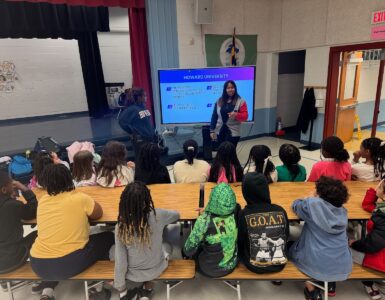After the balloons fly away, the tassels are turned, and the degree is placed under the bed, an important question remains: What exactly is next?
College graduates across the nation are finding out that answering this question is quite difficult. Many new graduating students are experiencing difficulty landing their first job, and the prime reason is the economy.
After the economic plummet three years ago, companies are still struggling to find resources to hire additional employees. Although, more qualified graduates are completing school, companies have resorted to downsizing and horizontal integration to save costs.
Because of the economy “high-end firms hire fewer people and drive down salaries because jobs are in such demand,” according to aWall Street Journal article from 2009. “That means many graduates end up with lower-wage, lower-skill jobs at less-prestigious firms or in firms outside their field of interest.”
The disproportional shift is causing students to be left in disarray after they have left school. Cassandra Gayle, senior at Tennessee State University, explains she is anxious because of the uncertainty in her future.
“I’ve been searching for about two months now and most companies are telling me that they’ll keep in touch,” Gayle exclaimed. “But I need more than contact, I need a job.”
Gayle, who is a journalism major, represents the group of students who have the most difficulty finding jobs, right behind history majors, according to the National Association of Colleges and Employers (NACE).
However, NACE reports that the job market is opening up and looking more prosperous. Employers are projecting a 13.5 percent increase in their spring hiring NACE indicated.
President Obama also promised a brighter future for students during his 2011 State of the Union address when he ensured that his focus is to “create jobs.”
“I know the economy is improving and that I am in better shape than graduates from 2008, or 2009, however, it’s still hard out there and I don’t want to keep swimming in my student loans,” Gayle said.
Diamond Graham, a senior at Georgetown University, is taking a job that appears to be more promising than others in the recovering economy.
“I’m working for Teach For America in New York,” she said. Graham, like thousands of students across the nation, has committed herself to two years in which she will be teaching in an underprivileged school. “I eventually want to go into education policy so this was a magnificent offer that I could not pass up.” Teach For America hires more graduates every year and has become the new alternative for students who aren’t quite sure about their future. While it hires the top students in the nation, its diverse prerequisites have made it a high option for many graduates in the past few years.
Alternatives for graduates to consider include graduate school, study abroad programs or internships. While graduate school won’t pay for the undergraduate debt, it’s a healthy alternative. Becoming better qualified during the shaky job climate is safer than continuing the search unemployed. Many schools offer study abroad programs for new graduates who want to teach or get a few more classes under their belt; the programs are great additions for resumes. Also, post-graduate internships are good options as they give graduates a feel into different fields and open up the possibility of turning into future jobs.
College advisors are agreeing that though a student might not initially get their ideal job, students must be willing and flexible to consider other job options. It is important to keep searching and to take up what is offered, instead of remaining stagnant.
“I was an advertising major when I was in school, and now I’m teaching pre-k,” said Avery Green, a 2010 Howard University graduate. “I freelance and work with ESSTXR Film Company, but it’s all for the purpose of building my experience and portfolio. Teaching pays the bills, and I’m blessed to be at both.”
Green who has been working for a little over a year sees that it is important that graduates diversify their background, look beyond what their degree says, and always have second plans. “I look at teaching as expanding my skill set. After all those people got laid off in the past few years in jobs such as PR and advertising I saw that a backup plan was very necessary.”










Recent Comments